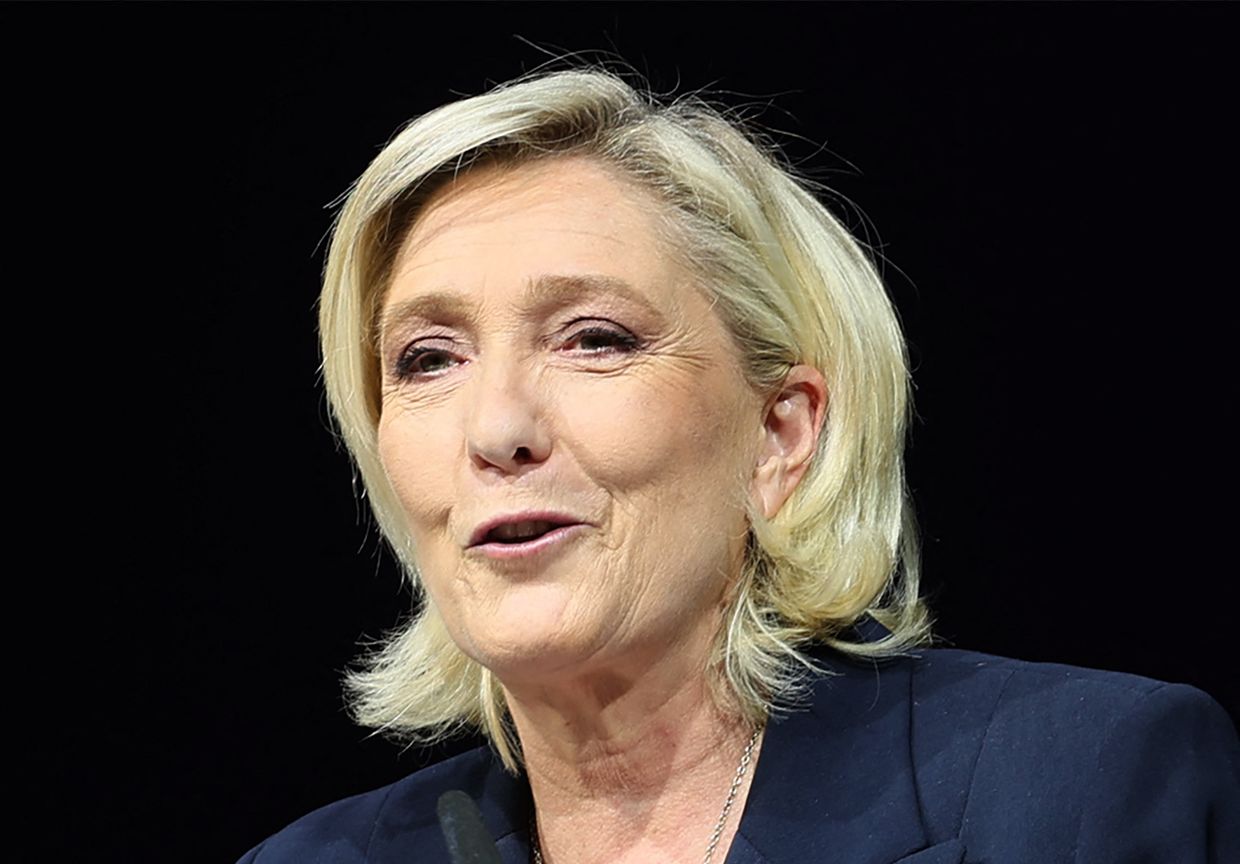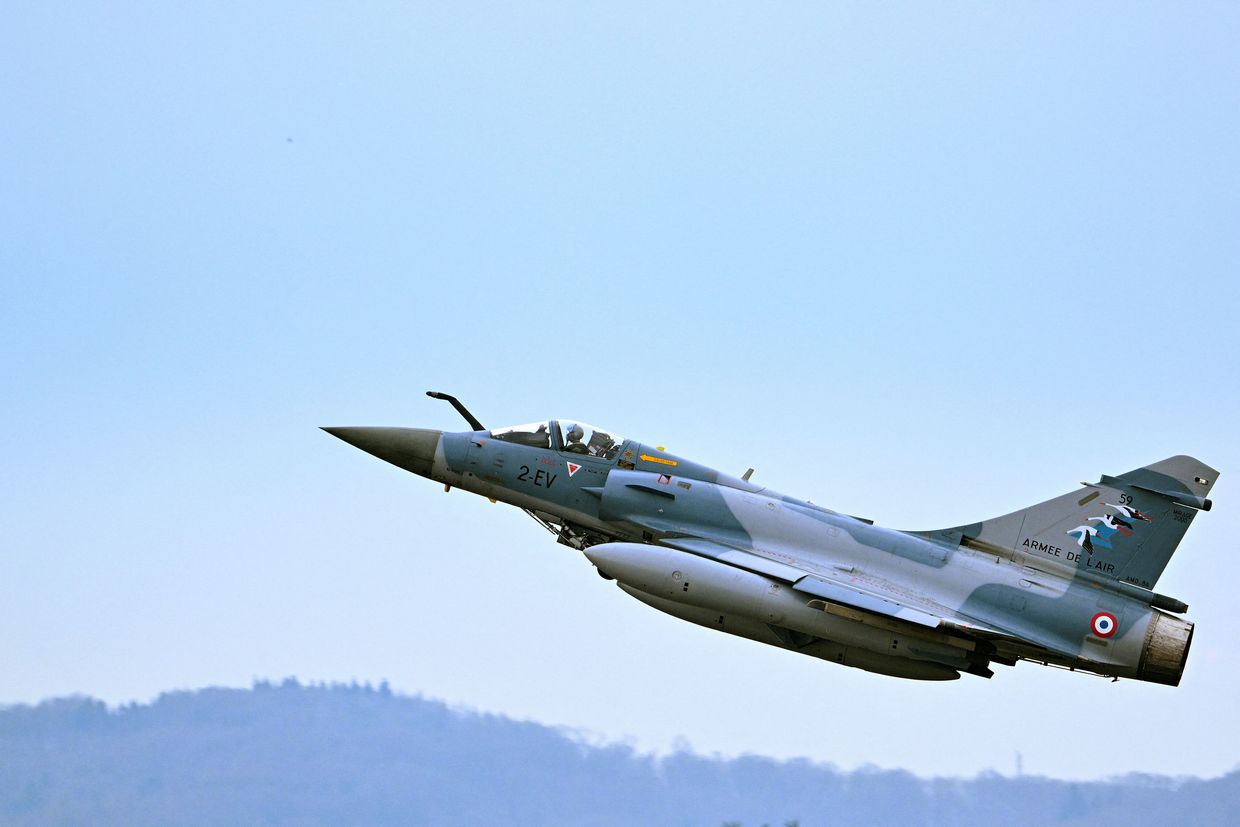French far-right surge threatens the country's commitment to Ukraine

Former president of the French far-right Rassemblement National (RN) parliamentary group Marine Le Pen gives a speech during the results evening of the first round of the parliamentary elections in Henin-Beaumont, northern France, on June 30, 2024. (Francois Lo Presti / AFP via Getty Images)
France is gearing up for its second round of legislative elections scheduled for July 7, which could provide the far-right National Rally (RN) with a historic victory and their first-ever chance to appoint a prime minister.
Headed by 28-year-old Jordan Bardella and parliament leader Marine Le Pen, the National Rally ran on a Euroskeptic and anti-immigration platform while attempting to brush off its ties to the Kremlin.
While the party sought to tone down its pro-Kremlin rhetoric ahead of the parliament election, even ostensibly speaking in support of Kyiv, the potential power-sharing between President Emmanuel Macron and the National Rally could undermine France's efforts to push allies to do more for Ukraine.
Le Pen's victory would also cast a shadow on future supplies of SCALP missiles, or their use against military targets inside Russia, the pledged Mirage 2000 jets, and any plans to send military instructors to Ukraine.
What is the situation?
The elections for the French parliament's lower chamber – the National Assembly – weren't scheduled for another three years. Yet, Macron called a snap election in a shock move after his party suffered a disastrous result in the European elections in June.
France's National Assembly has 577 seats, with lawmakers elected for five years in single-seat constituencies.
After the first round eliminates those candidates who failed to win at least 12.5% of the registered voters, the second round decides the final winner in what is usually a two-way or three-way contest.

To achieve an undisputed victory, a party must win at least 289 seats, an absolute majority.
Macron's coalition had only 250 seats in the previous parliament, meaning it had to curry favors with other parties to pass legislation or use other means, such as the 49.3 clause, to push it through.
Whatever Macron's snap election gamble was, it has not paid off so far.
The National Rally came first in the first round with 33.15%, followed by the left-wing New Popular Front alliance (28.14%) and Macron's centrist Ensemble trailing third (20.76%).
Thirty-nine candidates from RN and its allies managed to secure over 50% of the votes in their respective districts on June 30, meaning they already won the seat.
Facing a far-right majority, the New Popular Front instructed all of its third-place candidates who were able to secure over 12.5% to pull their candidacy to strengthen the anti-right ticket. While Macron's party was more vague on the subject, some 224 candidates who came in third withdrew their candidacy, with later polls showing that such a strategy might actually cost the National Rally its potential absolute majority.

Such a situation could lead to a hung parliament.
If the National Rally succeeds in pushing Bardella into the prime minister seat, it will lead to the so-called "cohabitation," or the sharing of powers between the president and the prime minister from opposing political camps.
While earlier cohabitations established a practice where the prime minister ran domestic affairs while the president set the course of foreign and security policy, the French Constitution doesn't particularly state who is responsible for what.
Since there has never been a cohabitation of such a stark political contrast, it remains to be seen whether the far-right prime minister will respect the president's foreign and security policy domain.
The Rally and the Kremlin
Le Pen and her party have traditionally been ranked among the most Kremlin-friendly political forces in the EU.
The far-right party took a controversial 9-billion-euro loan from a Russian bank in 2014 despite sanctions imposed on Moscow over Russia's war against Ukraine and its occupation of Crimea.
The sum was repaid only last year.
Le Pen also called the illegal annexation of the peninsula legitimate in 2017 and has dubbed Russian President Vladimir Putin as a "patriot" and the bulwark of traditional European values.

In April 2022, not long after the outbreak of the full-scale war and shortly before the French presidential election, Le Pen called for "a strategic rapprochement between NATO and Russia" once the "war is over and has been settled by a peace treaty."
More recently, a shift in the party's rhetoric emerged, indicating that the party is seeking to shake off its pro-Kremlin image.
The media noted in June that the far-right party quietly deleted a part of its manifesto that called for closer relations with Russia and leaving NATO military command.
Speaking to the National Assembly in March, Le Pen surprised many by voicing support for Ukraine, saying that Russia "triggered the war on the EU's doorstep and the most dramatic geopolitical crisis in the last 20 years."
"We owe our respect and support to the Ukrainian nation, which has endured aggression... It is the heroic resistance of the Ukrainian people that will lead to Russia's defeat," she said.
Bardella called Russia a "multi-dimensional threat both for France and for Europe."
Many have been skeptical about the sincerity of the RN's turn.
"The shift in the RN language on Russia is purely tactical," said Sudhir Hazareesingh, an expert on French politics at Oxford University, in a comment for the Kyiv Independent.
Le Pen's party does "not want to seem hostile to Ukraine, as there is wide public support for the Ukrainian cause in France," he explained.
In a column for Le Monde, a group of 170 French diplomats voiced concern about France's future foreign policy direction should the far-right party win.
"We have seen Russia invade sovereign states and use tanks to destroy what has guaranteed peace on the European continent," the column read.

"Our duty as citizens and servants of the state is not to compromise with the truth. Submitting to Russia, to authoritarian regimes, undoing Europe and our alliances, ignoring international law, is to choose impotence and servitude."
"The Kremlin will have agents of influence and information. There are links (with the RN) that have long been established. So we must be vigilant," Michel Foucher, a former French ambassador to Latvia, said in a comment to the Radio France International (RFI).
Moscow's reaction to the RN's success in the first round is also telling.
The Russian Foreign Ministry lauded Le Pen and Bardella's party success, saying, "The people of France are seeking a sovereign foreign policy that serves their national interests & a break from the dictate of Washington & Brussels."
Ramifications for Ukraine
Bardella pledged to continue providing Ukraine with defense aid if he becomes prime minister, but also set out clear red lines regarding this support.
"I don't plan to send.. long-range missiles or other weapons that will allow Ukraine to strike the Russian territory," nor "French troops and soldiers to Ukraine," the far-right leader said.
Paris has provided Ukraine with over 2.6 billion euros ($2.8 billion) worth of weaponry in 2022-2023, including SCALP long-range missiles and Caesar howitzers. Macron also pledged to provide Ukraine with Mirage 2000-5 jets, which could be a major reinforcement to Ukraine's battered Air Force.
Since both SCALP and Mirages could be theoretically used to strike military targets inside Russian territory, Bardella's comments cast a shadow over future supplies.
Le Pen also told CNN that the RN government would not allow the use of French long-range weapons Ukraine possesses to strike inside Russia.

The French Constitution also names the prime minister as the effective head of the Armed Forces during cohabitation, which could thwart Macron's potential plans to send military instructors to Ukraine.
Hazareesingh believes that the RN government "would not want to look like it was contesting (Macron's) legitimacy too directly."
As for the disagreement on the troop deployment, the political scientist was skeptical about whether Macron actually wants to take this step, adding that Bardella's opposition would provide a suitable excuse to abort the plan.
Based on the statements of the RN leaders and Macron's continued presence in the Elysee Palace, there is little fear that the French backing of Ukraine would cease altogether.
Far-right victory might, however, undermine the president's plans to profile France as the most resolute voice of the pro-Kyiv coalition.
It might also complicate Ukraine's EU accession talks.

Macron, whose strategic vision appears to be building up the European bloc into an independent strategic player, backed Kyiv's EU candidacy. Ukrainian and European delegates began the accession talks in June, with an eye on Kyiv's entry as early as 2030.
In line with her party's Euroskepticism, Le Pen said in June that she's opposed to "any enlargement of the European Union."
"I do not want to see French agriculture die, nor do I want the French to pay ever more taxes to finance the entry of new countries into the European Union," Le Pen said.
Should the RN manage to secure their historic victory, the full consequences are yet to be seen.
A Dutch scenario sets a hopeful precedent where the victorious far-right took a back seat on the foreign and defense policy while focusing more on domestic issues.
The growing wave of right-wing populists with a history of praising Putin – a phenomenon shared on both sides of the Atlantic – certainly does not bode well for Ukraine in the long term, however.












